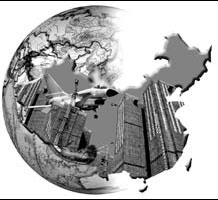A recent survey by the British Broadcasting Corp's World Service asked some 28,000 people from 27 countries to evaluate 12 countries on measures of positive or negative influences on the world.  China came out among the countries with a more positive than negative ranking, but still fell behind Canada and Japan, which took the top two spots for good world image. China came out among the countries with a more positive than negative ranking, but still fell behind Canada and Japan, which took the top two spots for good world image.
I agree with the researchers who conducted the poll that countries exerting what they term "soft power" tend to win more favor internationally than those that rely on wielding "hard power", or military might. A country's soft power comes from its efforts to promote social progress and well-being domestically and throughout the world through business, education, culture, environmental protection, healthcare, poverty relief and many other areas. Communication to make such efforts understood, paralleling increased participation in international endeavors to make the world a better place to live, also is important. We still have problems getting these messages across to the rest of the world. It's not enough to accuse outsiders of ignorance about China. Nor is it enough to support Confucius Institutes all over the world to help address such ignorance, although of course this is a very positive step. We must improve our own understanding of others, recognizing that our own limited knowledge of the outside world is one reason for failed communications. A team of top managers from a company in Yunnan Province came to Beijing on Sunday to seek advice from an American businessman and his British associate. They hired a PhD student from a leading university in Beijing as their interpreter. But the discussion hit a dead end because the interpreter, despite his language skills, was not knowledgeable enough to understand what the American businessman was driving at. Lack of knowledge goes far beyond jargon and terminology in business, trade, sciences or technology. Often we stumble because we ourselves are not versed in international rules, practices and requirements. In the business world especially, companies need to know about, practice and communicate corporate social responsibility. A Chinese company that recently concluded a merger with a local manufacturer in Britain took days before it began to address how the merger would affect the local community and its residents. Explanations should have been forthcoming sooner. Still, we can applaud the company for its disclosures, since the action is an improvement on standard practice in China, where managers of major projects seldom share information with local communities and residents about any disruptions the projects may cause as well as benefits it may offer. The ingrained tradition of keeping quiet sometimes inhibits us in exchanges on the individual level as well. Reticence has long been considered a virtue in China, whereas candor or outspokenness only invites trouble. Unfortunately, reticence has prevented a lot of Chinese trade people, engineers, technicians and even students from communicating with their partners, co-workers, schoolmates and teachers; and for want of practice, they end up having a hard time getting their ideas, problems and accomplishments across. I still remember my own frustration when I attended the caucuses on civil society at the United Nations two years ago, as the UN reviewed the situation of the world's women a decade after the Fourth World Conference on Women. I discovered that I lacked the courage to speak out, even though in my mind I had plenty to offer. I then realized that others will never learn who we are, what we do and what we aspire to if we keep it to ourselves. E-mail: lixing@chinadaily.com.cn (China Daily 03/15/2007 page9)
|

